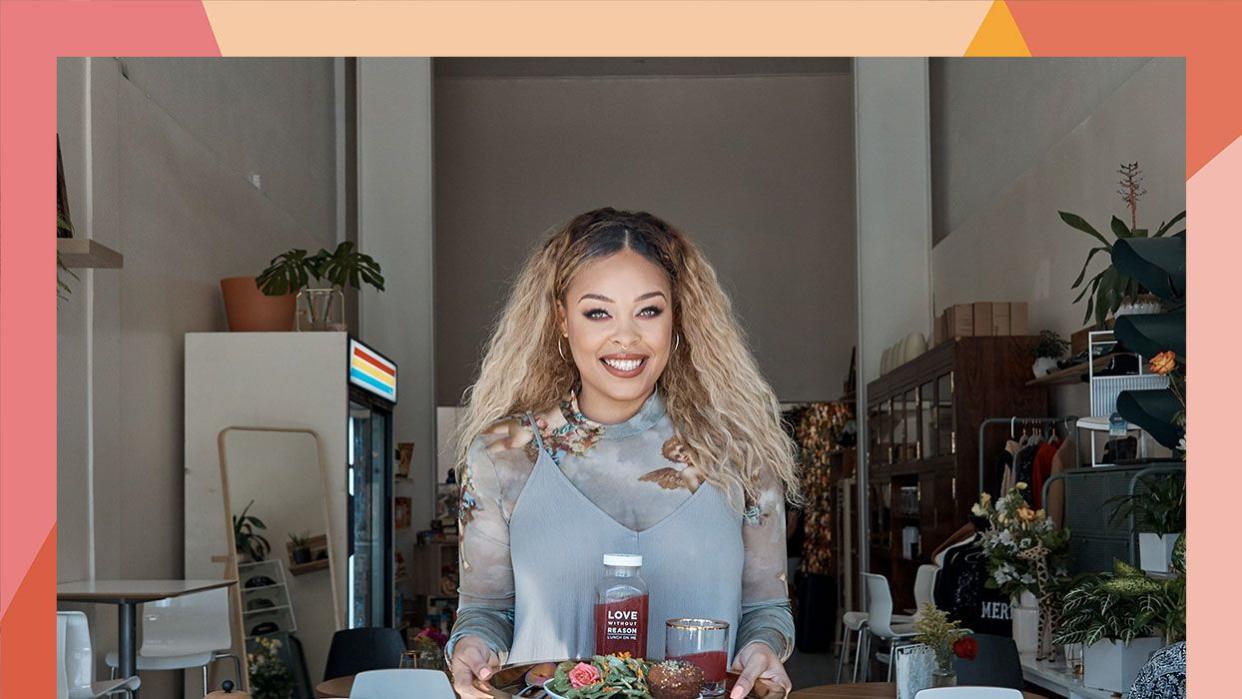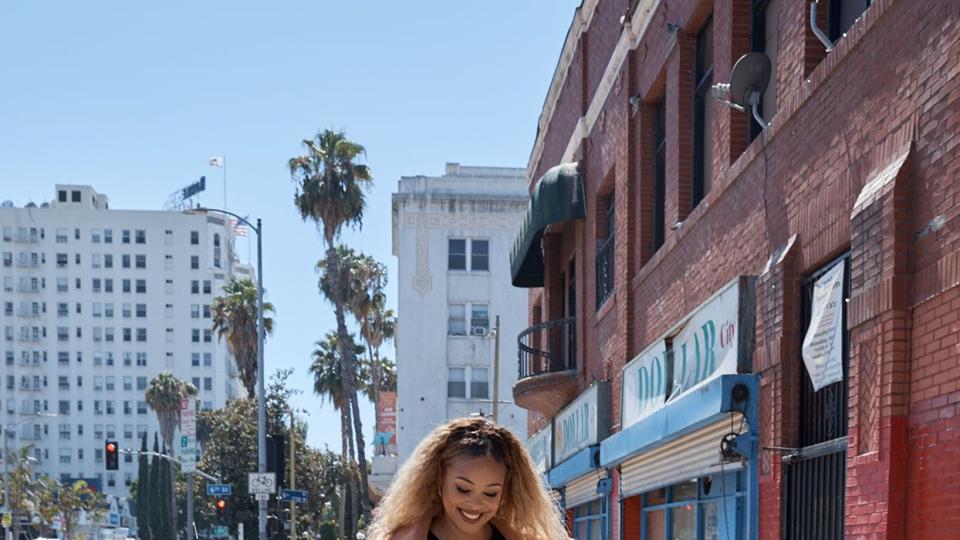The Story of How LaRayia Gaston Founded Lunch On Me Will Move You to Take Action

Magdalena Wosinska
LaRayia Gaston was working in a restaurant at age 14, throwing away a bunch of perfectly good food (food waste is inevitably common in the industry), when she saw a homeless man digging in a trash can for food, so instead, she gave him the "leftovers". That was the first homeless person she fed—and little did she know, this small act of humility would shape the rest of her life.
"In that moment it was simple: A man is hungry, and I have food that's being wasted," says Gaston. "At the time, I didn't necessarily know it lead me to the place that I'm in now, but it's definitely the pivotal moment that made me aware of the simple, immediate needs of others that could be met on a daily basis."
Gaston is now the founder and executive director of Lunch On Me, a Los Angeles-based nonprofit that redistributes organic food (that would otherwise be wasted), feeding meals to 10,000 people in Skid Row every month. Their work goes far beyond placing food in people's hands; Lunch On Me is dedicated to ending starvation while providing opportunities to enrich the mind, body, and spirit of LA's homeless community through yoga classes, community parties, and healing gatherings for women.
Read about how she got her start, the reason you need to care more about hunger and homelessness, and how you can help.

Magdalena Wosinska
Starting Early and Starting Small
"I grew up in the church where 'tiding' was really big. (Tiding is when you give 10 percent of whatever you have and it goes to charity or you can give it to the church). So, growing up, I was always taught that 10 percent of everything you own has to be distributed; it's not yours. And for me, I didn't really resonate necessarily with the church. I was like 15 years old and I asked my mom if it was okay if instead of pledging in the church I just fed people—and that's when it started, because my mother said, 'I don't care what you do, you just have to do your part'.
Then when I moved to LA, I saw the homeless problem and continued my normal habit of tiding and helping feed people. I didn't do just one thing; I'd help in any way that I could. So if I was at Starbucks, I would buy milk for whoever was around. If it was a holiday, I was making extra meals to hand out. If I was at a grocery store, I was buying extra food. If I was eating alone, I would invite someone in that may be homeless that was standing outside of a restaurant. And I loved it. It resonated with me more than writing a check to a church. Because I liked it, it made me a cheerful giver."

Magdalena Wosinska
Teaming Up for a Bigger Impact
"I gave back like that for 10 years before anyone ever knew. It was my private way to give back; it was a really intimate thing for me. One day, a friend got involved in cooking meals with me before a holiday and really enjoyed it—and that was the first time I really had the idea that I could reach out to some charities or that this could be a bigger thing than just me.
So I started volunteering, and every place I did, I was disappointed. I didn't like what I was seeing in the non-profit world. There was this serious disconnect—more so than me inviting random strangers to eat with me. It was all about money and numbers and not about the people. At one point, I stepped up to raise money where an organization was falling short, and that's when I made the radical decision to start my own non-profit. I don't know anything about nonprofits or how they run; I just know how to love people. And I recognized in that moment how valuable what I had was, that I could reach people in a different way. I think it started with the fact that I actually looked at people as people.
So that's how Lunch On Me started. I had no idea what to do, so I just called up 20 or 25 of my friends—basically everyone I knew in LA—and said, let's do cold-pressed juice and vegan pizza, and take it to Skid Row. We're going to the streets. And then 120 people showed up, because every friend I had brought friends. We fed 500 people in that first day."

Magdalena Wosinska
Solving the Hunger Problem
"That first day felt like a huge accomplishment. But then someone asked, 'when are we going to do this again?' and I realized I'd never thought about it: These 500 people were going to be hungry tomorrow. That was the first time I realized that, until it was solved, the work was never done.
I just decided, ok, let's do once a month. Within a year and a half, we went from 500 meals a month to 10,000. But I realized that doing it at this scale was going to take a different approach. So I started researching food waste and realized there's so much. I began reaching out to grocery stores and asking, 'where does your waste go?' Basically, I went around presenting these ideas of redistributing food waste to give to Skid Row, and I specifically targeted organic, plant-based foods. That wasn't intentional; I wasn't trying to make this a health and wellness thing. I just wanted to share what I had, and that's the way I eat.
The biggest challenge is the fact that people don't respect homeless people as people. They see them as less than. It's not easy to tell people to stand up and advocate for someone that they see as beneath them. So it's a lot of educating on how people become homeless. People don't see the amount of pain and the lack of support and the core issues of why and how people get there. They don't see that 50 percent of foster kids become homeless within six months after turning 18. They don't see that war veterans don't have enough emotional support after war, and are medicated, and no one's addressed their healing. They don't see senior citizens that are under rent control and can't afford a 5-percent increase because of what they're allotted through retirement. They don't see someone that's worked their whole life as a janitor, thinking they did everything right, and is kicked out of their place because the area gentrified and they have nowhere to go. They don't see the pain behind how people get there, and they don't recognize it. That's something we deal with a lot: The privilege and ignorance around homelessness. People think that they think that just getting a job follows the problem."
Staying True In the Nonprofit World
"If you stay checked into your own heart, your own humanity, when you're navigating challenges, it becomes easier, because you're listening to your heart. Don't disconnect from it. Don't get so accustomed in the systems and rules that you lose touch of that."
Inspired? Head to Lunch On Me's website and CrowdRise page to donate or find other ways to help.

